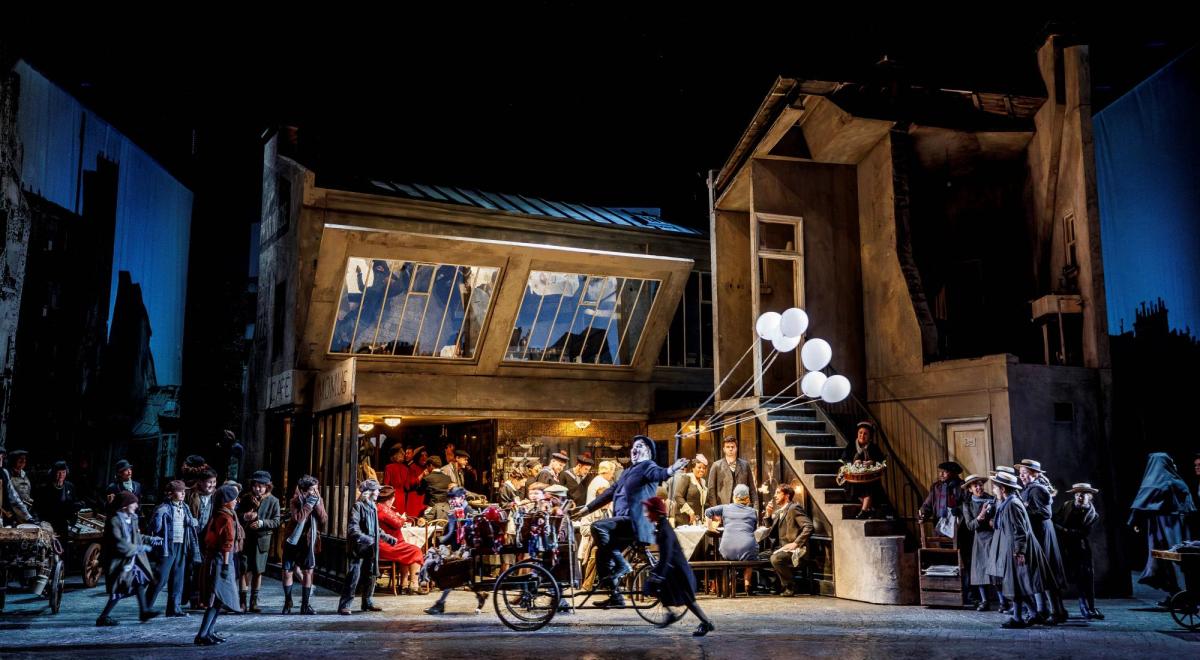The English National Opera (ENO) has enjoyed considerable success over the years with Sir Jonathan Miller’s acclaimed production of La bohème. First opening here in 2009, it’s back for another season as part of the centenary celebrations for composer Giacomo Puccini.
Miller has taken the tragic love story of Mimì and Rodolfo, the embroiderer and the writer, and set it in 1930s Paris; the opera was actually written and premiered some 40 years earlier in the 1890s.
La bohème (the bohemians) received a mixed response at the time, probably due to its rather earthy subject matter, but has enjoyed sustained popularity ever since. Reimagining the time and place happens often – the last production I saw set it among ‘the fishnets and fairy lights of 1930s Berlin’ and another was updated to the social unrest on the streets of Paris in 1968.
There was also a wonderful Opera Australia version staged under the stars on the spectacular Sydney Harbour back in 2018. In fact, it’s so popular that there’s always a production on somewhere, and sometimes up to 500 productions in a year.
La bohème is about love and loss – about the hand we are dealt in life – and the cards we choose. It’s set to some of Puccini’s most exquisite music, which here was played to near perfection by the ENO Orchestra under Italian conductor Clelia Cafiero in her UK opera debut. It’s always a shame at the opera when all you can see of the orchestra is the tip of the conductor’s baton working away in the pit.
Ultimately this is a story about money and class – or the lack of them. Puccini himself was born into a working-class family, with lots of siblings and little money, so perhaps he identified with the libretto about doing it tough, based on Scenes of Bohemian Life (Scènes de la Vie de Bohème) a collection of short stories by Henri Murger, published in 1851.
At the heart of the opera is the doomed love story of Mimì and Rodolfo, two young Parisians who meet by chance and fall in love. Rodolfo lives the artistic, bohemian life of the title, but Mimì is a little more conservative and works hard to support herself. We know from the moment we meet Mimì that she is unwell, the stairs to Rodolfo’s attic apartment making her breathless. By the tragic finale she succumbs to her ailment, tuberculosis (TB) or consumption as it was then known – such a common illness of the time.
In his first role with the ENO, internationally renowned tenor Joshua Blue plays Rodolfo here. He has a rich, warm voice, but he really needs a little more volume and projection, especially in the first act. And if there’s a criticism to be made of this production, it’s that Rodolfo and his mates all seem far too comfortable with their lot in life to actually be struggling artists starving in their bohemian garrets.
Blue is usually alongside British lyric soprano Nadine Benjamin MBE as Mimì, but for the performance this reviewer attended, Benjamin was unwell and the role was taken by Madeline Boreham, a young soprano currently studying at the Royal College of Music. Already recognised as a singer of talent and potential, Boreham gave a superb performance for a mainstage debut. She handled the demanding role with flair and sensitivity and really won the hearts of the audience. It was lovely to know that her mum was there to hear the appreciative applause! Boreham is definitely one to watch.
The ensemble cast work together seamlessly and the big chorus scene outside Café Momus, complete with children and a sprinkling of snow, is a delight. A special mention must be made of young South African soprano, Vuvu Mpofu, who absolutely sparkles as the sassy Musetta.
All the action takes place on a marvellous two-storey set designed by Isabella Bywater. Created as two building blocks, the set is rotated at key points to form new streetscapes and changing scenes. This is complemented by projections of the Paris rooftops and dusky lighting designed by Jean Kalman. Together, the set and lighting are extremely effective in evoking the mood and atmosphere that are so essential to the story.
Although set in Paris and written in Italian, this production is sung in English; even so, the surtitles high above the stage definitely help the audience follow the narrative. But it is, of course, Puccini’s beautiful score that really tells the story and carries the full emotional weight, and here it is played with the perfect blend of wit and pathos.
Read: Don’t miss in October – your monthly guide to the brightest and best arts in London
This production is a delightful celebration of Puccini’s much-loved opera and one worthy of a full house every night!
La bohème
English National Opera
With the ENO Chorus and Orchestra and the Children’s Chorus of St Joseph’s Catholic Primary School
London Coliseum
Conductor: Clelia Cafiero
Director: Jonathan Miller
Revival Director: Crispin Lord
Set and Costume Designer: Isabella Bywater
Original Lighting Designer: Jean Kalman
Revival Lighting Designer: Marc Rosette
Translator: Amanda Holden
Principal Cast: Madeline Boreham, Nadine Benjamin MBE, Joshua Blue, Vuvu Mpofu, Charles Rice, Patrick Alexander Keefe, Dingle Yandell, Paul Sheehan, Andrew Tinkler, Adam Sullivan, Robert Winslade Anderson, Ronald Nairne
La bohème will be performed until 19 October 2024.





